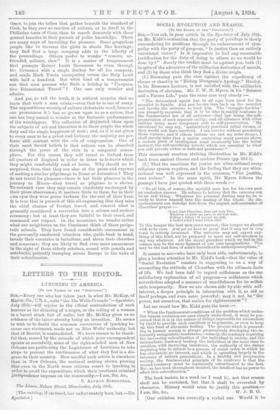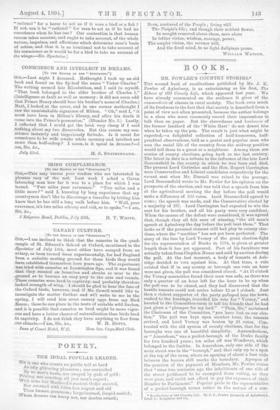SOCIAL EVOLUTION AND REASON.
[To THE EDITOR OP THE " SPECTATOR."J Sin,—You ask, in your article in the Spectator of July 28th„ on Mr. Kidd's contention that the party of privilege is slowly surrendering its positions through its undercurrent of sym- pathy with the party of progress, "Is justicei then an entirely unrational virtue P Is it impossible to find any reasonable- justification for the duty of doing to others as we would be done by F" Surely the verdict must be against you, both (1) in spite of the advocates of the utilitarian derivation of morals,. and (2) by those who think they find a divine origin.
(1.) Browning puts the case against the expediency of shame or chastity in "Bishop Blougram's Apology." Huxley,. in his Romanes Lecture, is not satisfied with the utilitarian) derivation of altruism, Mr. F. W. H. Myers, in his "Science and a Future Life," puts the same case very clearly :-•-•
"The determined egoist has in all ages been hard for the moralist to handle. And now he can turn back on the moralist and invoke the universe to back him. The 'struggle-for-lifer can plausibly maintain that it is he who in reality conforms to- the fundamental law of all existence—that law being the self- preservation of each separate entity ; and all alliances with other
entities being mere temporary aids to self-preservation. My. ancestors,' be may say, instinctively practised tribal virtues, or they would not have survived. I can survive without practising those virtues ; and if others imitate me and my tribe decays, I shall merely infer that a nation containing many persons above, a certain pitch of intelligence must necessarily lose the tribal instinct, the self-sacrificing naiveté, which are essential to what you call private virtue or national greatness.'" This statement receives striking illustration in Mr. Kidd's. book from ancient Greece and modern France (pp. 294.5).
(2.) That the sanctions for justice are ultra-rational every religious system requires, and the feeling that they are ultra- rational was well expressed in the sentence, "Fiat justitia,. ruat ccelum." In the same spirit, Mr. Myers follows the passage I have just quoted with these words :— " To all this, of course, the upright man has for his own part an unshaken answer. He refuses to believe that the universe can be an evil thing. Whatever his personal destiny may be, he is ready to throw himself into the destiny of the whole. No dis- enchantment can dislodge him from the august self-surrender of Cleanthes' prayer :—
• Lead, lead Oleanthes, Zeus and holy Fate, Where'er yo place my poet, to serve or wait; Willing I follow ; if against my will, A baffled rebel I must follow still.'
To this temper the best men come nearest ; this temper we shouldP wish to be ours. And yet we have no proof that it may not in verp truth be entirely irrational. The universe may not expect any- thing of this kind, nor be prepared to meet our self-devotion in any way whatever. All the moral grandeur which we feel in the, cosmos may be the mere figment of our own imaginations. This may be the last form of man's ineradicable anthropomorphism."
It seems to me—who have only been able, unfortunately, to- give a broken attention to Mr. Kidd's book—that the value of "Social Evolution" consists in suggesting to us a way of reconciling the attitude of Cleanthes with the ultimate facts, of life. We had been told to regard selfishness as the one satisfactory explanation of all progress—a selfishness which. nevertheless adopted a measure of unselfishness for its selfish, ends temporarily. Now we are shown side by side with self- interest, a deeper principle in interaction with it, as old as itself perhaps, and even more powerful; may it not be "the. power, not ourselves, that makes for righteousness " Let me recall how Mr. Kidd puts the issue :— " When the fundamental conditions of the problem which under- lies human evolution are once clearly understood, it must be per- ceived that it is in the nature of things impossible for rationalism, by itself to provide such sanctions or to generate, or even to keep. -up, this fund of altruistic feeling. The process which is proceed- ing in human society is always progressively developing two in- herently antagonistic tendencies,—namely, the tendency requiring the increasing subordination of the individual to society, and the- rationalistic tendency leading the individual at the same time to• question, with increasing insistence, the authority of the claims requiring him to submit to a. process of social order in which he- has absolutely no interest, and which is operating largely in the interests of unborn generations. In a healthy and progressive society, the fundamental principle of its existence is that the second tendency must be continually subordinated to the first. Bu, as has been throughout insisted, the intellect has no power to.. effect this subordination."
The book insists, in a word (as I read it), not that ream) shall not be exercised, but that it shall be overruled by character. History would seem to justify this position.— [Our criticism was avowedly a verbal one. Would it be " rational " for a horse to act as if it were a bird or a fish ? If not, can it be " rational " for man to act as if he had no .conscience when he has one Our contention is that human reason takes account, and ought to take account, of the whole nature, impulses, and affections which determine man's basis of action, and that it is as irrational not to take account of his conscience as it would be for a bird to take no account of its wings.—En. Spectator.]



































 Previous page
Previous page